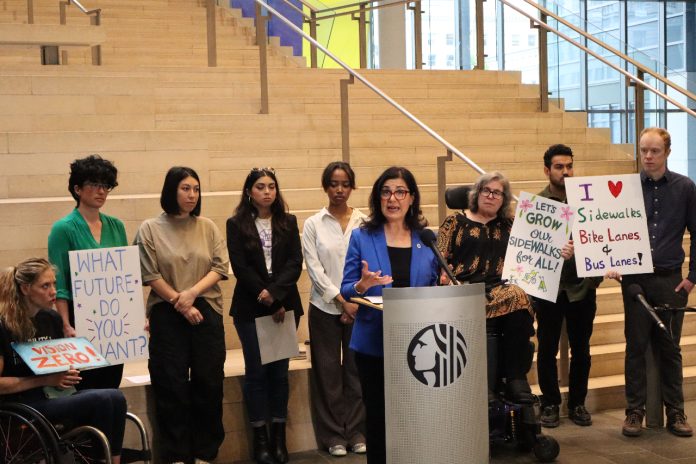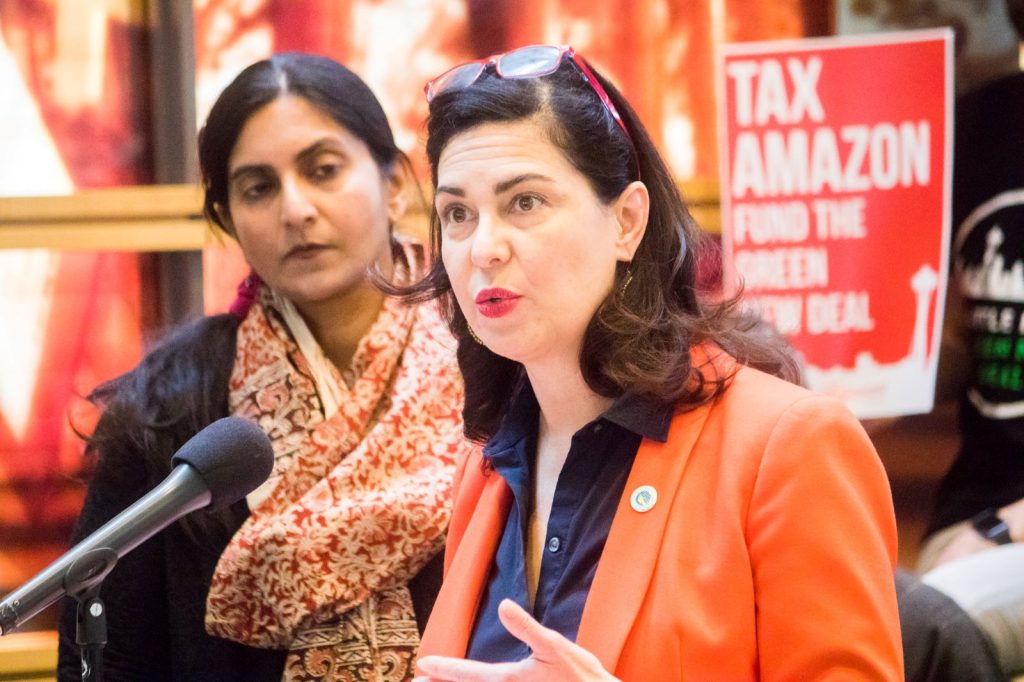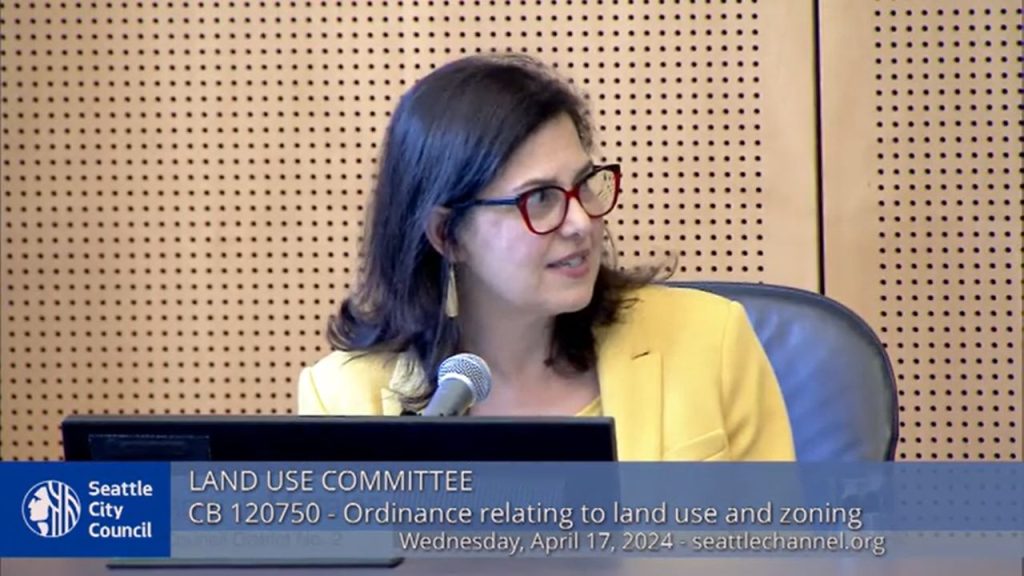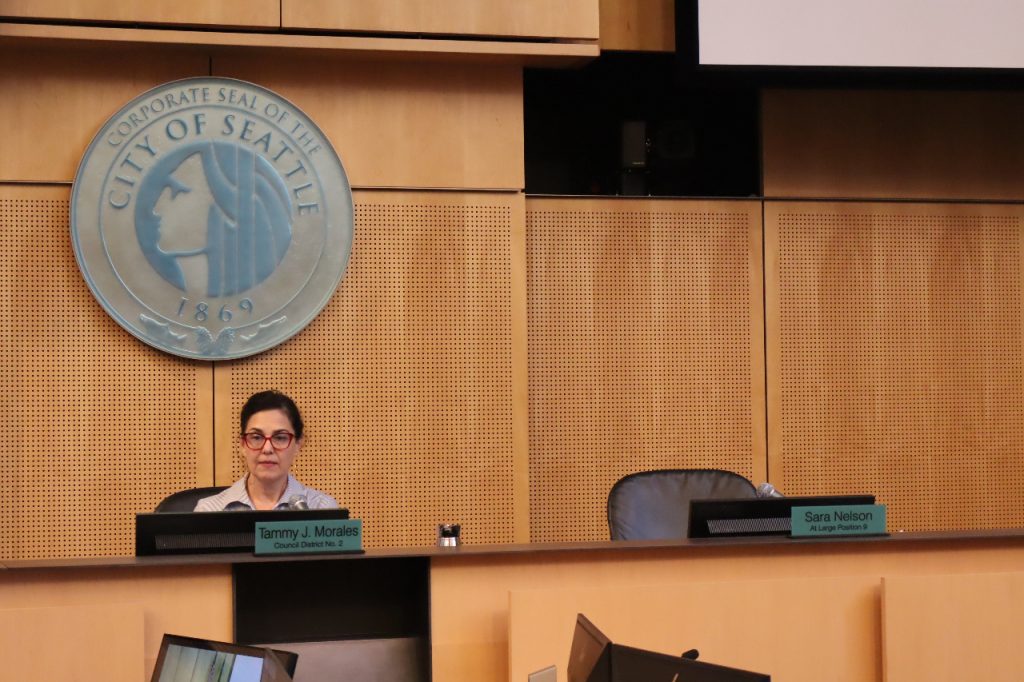
District 2 Seattle City Councilmember Tammy Morales announced Wednesday morning that she will resign her seat on January 6, 2025, saying she has been undermined, singled out, and frozen out of legislating by the more conservative-leaning council majority. Her resignation comes just days after Alexis Mercedes Rinck joins the council as a progressive ally to Morales.
Rinck won a resounding 17-point victory over centrist appointee Councilmember Tanya Woo in a special election held in a high-turnout presidential year — municipal races typically happen in low-turnout odd years. Morales’ resignation sets up another council appointment and a special election next fall, when Rinck and Council President Sara Nelson will also face citywide reelection fights as their terms expire.
District 2, which covers Southeast Seattle and much of the Chinatown-International District, will be the only district seat on the ballot next year. It is also the only district in Seattle where people of color constitute the majority rather than minority, adding another dimension to Morales’ ostracization.
Morales suggested the stonewalling by her colleagues went beyond politics, and started to feel personal and targeted. Few of Morales’ budget amendments passed last month, even fairly innocuous measures that Budget Chair Dan Strauss added to the consensus balancing package. Bullying tactics began affecting her health and family, she said.
“This was a very difficult decision. I’ve thought a lot about my responsibility to my constituents and to the Council as an institution,” Morales said in a statement. “I also have a personal responsibility to my family, who deserve to see me show up whole. This role has caused my mental and physical well-being to deteriorate, and this is an unfortunate reality for many women in particular who serve in public office.”
Morales told PubliCola that she thought about resigning in September after “screaming” at her family following a confrontation with colleagues during a council meeting, as work stress poured over into personal life.

Along with being vastly outnumbered by the new centrist majority that came to power in 2023, Morales often served as a stand-in for the entire progressive council that group replaced, including socialist firebrand Kshama Sawant. In an emblematic exchange this past month during budget deliberations, District 7 Councilmember Bob Kettle attacked Morales for an amendment that would have moved funding out of a proposed police CCTV system and into tenant services.
“[It’s] unconscionable that you created a situation and now you want to take out the fix for that situation,” Kettle told Morales.
In the end, Morales cast the lone vote against that budget, her first time doing so since being elected in 2019. Strauss acknowledged the unfair treatment before the final budget vote, telling Morales, “I’m sorry your priorities were targeted in the amendment process.”
With the departure of Morales, Strauss is only remaining councilmember who voted for the JumpStart payroll tax, which passed in a 7-2 vote in 2020. That revenue source has saved the council from making deep cuts this year and in previous budgets.
Last month, Mayor Bruce Harrell and the council diverted more than $300 million from the original JumpStart spending plan, which was primarily dedicated to affordable housing, and spent it on closing the budget deficit and adding about $100 million of their own new spending priorities. It seems doubtful today’s council would have voted for the JumpStart tax in the first place, given the staunch big business opposition, but they have no qualms about gutting the long-term spending plan and turning it into a slush fund.
While morose about the council’s work in the last year, Morales reflected on some of the victories over her broader five-year tenure on council, including new renter protections and eviction defenses that amounted to a “tenant bill of rights.”
“I’m proud of the work we’ve accomplished over my tenure, including passing the historic Race and Social Justice ordinance, our Tenants Bill of Rights, and securing over $350 million of investments in D2 and across the city,” Morales said in a release announcing the news. “However, I am worried about the future of this institution, and my place in it. For the last 11 months, this Council has eroded our checks and balances as a Legislative department and undermined my work as a policymaker.”
Early signs of discord
Plenty of signs that tensions were building were apparent well before budget season. Sparring started in January when the council appointed the runner up in Morales’ election, in a move she called undemocratic and out of step with the collegial and collaborative spirit centrists claimed they were ushering in.
“Seattle voters have been clear over and over again, that they reject the notion that special interests have a right to buy our elections, and it does all of us a disservice when we muddy the waters of what is supposed to be a clear and transparent process,” Morales continued. “As I said at our first council meeting of the year, I will do my best to work with this council to give the people of Seattle the services they need and the services they deserve. And to help create a culture of collegiality. We’ve all said that we all agree that that is important. And I need to be clear that this council nominated two of my general election opponents to serve as finalists.”

In another example, councilmembers rejected Morales’ equitable development incentive package in April, with her struggling to even get a second to her motion to discuss the idea at one point. The proposal, which she had been advancing for two years with broad support from community groups and housing nonprofits, wasn’t baked enough yet, colleagues said. Some suggested zoning changes would be better handled in the comprehensive plan. That didn’t sit well with Morales.
“We’ve been here [in committee] for two months now, and we’ve not passed any substantial legislation,” Morales said after her bill was voted down in April. “And I get that my colleagues are new, but it’s time to learn the job and do the thing. And, it’s disappointing that what I keep hearing is, I need more time. I don’t understand it. Yeah, so that’s frustrating.”
Seattle’s growth plan faces uncertain path and a tight timeline
Morales will leave just as she was preparing to helm the Select Committee on the Seattle Comprehensive Plan, a committee formed to tackle the broadest zoning changes that Seattle has seen in decades, impacting nearly every single family residential lot in the city and guiding growth for 20 years. Morales is the only councilmember with a background in urban planning, which could leave the body with a brain drain as it grapples with the complex issue of comprehensive planning — and the zoning regulations and development standards it queues up.
Delays getting the plan finalized in the Mayor’s Office has left council with a very tight timeline to amend and approve the plan before the state deadline of July 1, 2025 for middle housing changes. If Seattle doesn’t get the plan passed and signed by that date, the state model code would supersede single family zoning throughout the city, allowing sixplexes near frequent transit and fourplexes on all other residential lots.
Morales was an outspoken critic of Harrell’s initial growth plan proposal, which sought a permanent exemption from the state multiplex requirement in some areas deemed at risk of displacement and proposed little new apartment zoning.
“What we’re doing here is continuing the status quo,” Morales said in March. “We’re excluding the South End from intentionally planning for economic development opportunities. We’re doing ourselves to the same mistakes we made in the past and creating deeper economic inequality. This area was already identified as an area of low access to economic opportunity in the last comprehensive plan.”
Other councilmembers had also said they’d like to encourage more housing in the plan, but they have not grappled with specifics to the same degree as Morales. Plus, the centrists have less of a track record with getting out of line with the mayor, let alone standing up to him.
Eroding institutions
Morales cited a laundry list of initiatives or causes she pursued or supported but were stymied by her colleagues — sometimes for little cogent reason other than being associated with her.
While centrists will speak to the need for police accountability in the abstract, Morales noted they “passed 11 separate bills to increase the punitive nature of our criminal legal system without any additional meaningful accountability for our police department.”
Council has also approved a police contract with big raises and bonuses for police officers and increased the police department’s budget by 16% — more than $60 million — even in a budget with big cuts elsewhere without getting any significant new accountability measures. Morales was the sole vote against both that police contract and budget.
Since January, Morales said the new centrist-led Council has undermined the democratic process repeatedly:
- “Interfered with the ability of our non-partisan Council Central Staff to provide objective policy analysis.”
- “Suppressed the will of voters by offering an alternative ballot initiative that would effectively gut the Seattle social housing developer next February.”
- “Stifled first amendment rights during public comment by arresting people.”
- “Intimidated commenters by having a police presence when any controversial legislation is considered.”
- “Witnessed a significant reduction of institutional knowledge through the departure of 3 Council Central policy staff, the entire Council communications team, members of our human resources and finance team, and several legislative aides.”
- “Attempted to defund a critical program for addressing anti-displacement and supporting community economic development led by people of color.”
- “And passed a budget that reduces funding for social services for our most vulnerable while dramatically increasing funding for jails, police, and sweeps.”
Who will step up to lead District 2?
Morales won a tight 1.6-point victory in a wave centrist year in 2023, but District 2 has generally favored progressive-leaning candidates. That said, Mayor Bruce Harrell, an avowed centrist in his mayoral run, also made inroads and won the district in 2021, stemming in part from deep roots in Southeast Seattle and a landslide victory generally.
As far as which leaders will pursue an appointment to the Council District 2 seat in the interim, it’s not yet clear. Morales’ warning will likely give some pause about the work environment, particularly if they step out of line with the majority. Woo’s appointment process may also lead some to think the council majority will gravitate toward to a preordained outcome that pleases major donors.
“You were there when we needed to elect a new and moderate City Council.” Ceis wrote in an email to centrist donors leaked in January. “The independent campaign expenditure success earned you the right to let the Council know not to offer the left the consolation prize of this Council seat. Please support Tanya Woo and let the Council know about it.”
After losing her second election in 12 months, Tanya Woo is available. However, overturning an election result for the second time in that same span may not be palatable, even to the centrist allies who did that once and have showered Woo with praise on her way out.



